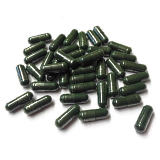Animal study: spirulina is a virus inhibitor
The blue-green algae spirulina - strictly speaking a cyanobacterium called Arthrospira platensis - may have virus-inhibiting properties. An animal study, published by Taiwanese virologists from Chang Gung University in Scientific Reports, suggests this. Of course, extrapolating an animal study to humans is risky. Against the background of alarming reports about the Covid-19 virus outbreak, we nevertheless read the study with above-average interest.In vitro study
In test tubes, the researchers exposed cells to various influenza viruses. The cells were also treated with different concentrations of a water based spirulina extract. Then the researchers determined the extent to which the cells and viruses could form plaques.
Viruses can glue cells together and make the form aggregates or plaques. The bigger the plaques, the more viruses there are present. The figure below shows that spirulina reduced the size of the plaques.


The researchers suspect that spirulina constituents such as phycocyanobilin inhibited the replication of viruses in the cells.Animal study
The researchers then introduced a deadly influenza virus into the nose of lab mice. Some mice were given spirulina extract 6 hours before exposure, and a few days afterwards.
The doses that the researchers used varied. If the mice had been human, they would have received 80-400 milligrams of extract daily. Based on what the Taiwanese write about the extract, that comes down to 400-2000 milligrams of dried spirulina.
The higher the doses of spirulina extract, the greater the survival rate of the mice.

"A cold water extract of spirulina [...] significantly inhibited virus infection and replication in a broad range of influenza viruses", write the researchers. "Survival was also improved in influenza-infected mice treated with Spirulina extract."
"With a long history of food use, high tolerated dose, and broad spectrum of anti-influenza activities, spirulina extract may serve not only as a viable therapy for the treatment of influenza, but also as a potential prophylaxis for the prevention of disease."
Source:
Sci Rep. 2016;6:24253.

|
In test tubes, the researchers exposed cells to various influenza viruses. The cells were also treated with different concentrations of a water based spirulina extract. Then the researchers determined the extent to which the cells and viruses could form plaques.
Viruses can glue cells together and make the form aggregates or plaques. The bigger the plaques, the more viruses there are present. The figure below shows that spirulina reduced the size of the plaques.


The researchers then introduced a deadly influenza virus into the nose of lab mice. Some mice were given spirulina extract 6 hours before exposure, and a few days afterwards.
The doses that the researchers used varied. If the mice had been human, they would have received 80-400 milligrams of extract daily. Based on what the Taiwanese write about the extract, that comes down to 400-2000 milligrams of dried spirulina.
The higher the doses of spirulina extract, the greater the survival rate of the mice.

"A cold water extract of spirulina [...] significantly inhibited virus infection and replication in a broad range of influenza viruses", write the researchers. "Survival was also improved in influenza-infected mice treated with Spirulina extract."
"With a long history of food use, high tolerated dose, and broad spectrum of anti-influenza activities, spirulina extract may serve not only as a viable therapy for the treatment of influenza, but also as a potential prophylaxis for the prevention of disease."
Source:
Sci Rep. 2016;6:24253.
